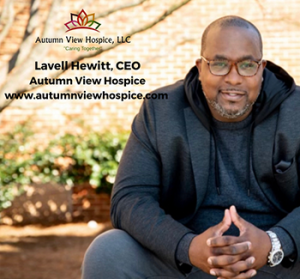Why African Americans Need To Have The Difficult Conversation
“Accepting that it was time for hospice for my mom was one of the hardest decisions of my life. Denial, sadness, and fear were my immediate reactions. And then I met the folks at Autumn View. They were compassionate, professional, and kind. I’m forever grateful.” ~~ Mari K. Bell
One of the most challenging things for anyone to face is watching a loved one slowly succumb to an illness. Unfortunately, it’s an inevitable part of life. Thankfully, however, hospice care can help make this experience more bearable for the patient and their family. But what about African Americans? Is hospice care a resource we are taking advantage of, or is it one we have yet to embrace fully?
Unfortunately, studies suggest that African Americans are significantly less likely to utilize hospice care than their white counterparts. In fact, data from the National Hospice and Palliative Care Organization shows that African Americans make up only about 8% of hospice patients, while whites account for more than 80%.
So why are African Americans so reluctant to seek out hospice care? The answer is complex and multifaceted, but a few contributing factors stand out. For example, many Black patients may shy away from hospice care because they fear it means giving up hope for a cure. There is also considerable distrust of the medical system rooted in African American communities for centuries. And there has been an undeniable lack of outreach and education about hospice care to African American populations—leaving many people unaware of what it entails and how beneficial it can be.
 But regardless of why we haven’t utilized it more, hospice care is an important resource that can make a world of difference when it comes to end-of-life care. Autumn View Hospice, located in Georgia, provides services tailored to meet each patient’s needs within ten counties (Barrow, Clark, Cobb, DeKalb, Hall, Gwinnett, Fulton, Newton, Rockdale, and Walton). This home hospice care provides physical and emotional comfort through expert medical attendants, chaplains, social workers, and bereavement specialists. The Medicare Hospice Benefit affords patients four levels of care to meet their clinical needs—Routine Home Care, General Inpatient Care, Continuous Home Care, and Inpatient Respite Care. Payment for each covers all aspects of the patient’s care related to the terminal illness, including all services delivered by the interdisciplinary team, medication, medical equipment, and supplies.
But regardless of why we haven’t utilized it more, hospice care is an important resource that can make a world of difference when it comes to end-of-life care. Autumn View Hospice, located in Georgia, provides services tailored to meet each patient’s needs within ten counties (Barrow, Clark, Cobb, DeKalb, Hall, Gwinnett, Fulton, Newton, Rockdale, and Walton). This home hospice care provides physical and emotional comfort through expert medical attendants, chaplains, social workers, and bereavement specialists. The Medicare Hospice Benefit affords patients four levels of care to meet their clinical needs—Routine Home Care, General Inpatient Care, Continuous Home Care, and Inpatient Respite Care. Payment for each covers all aspects of the patient’s care related to the terminal illness, including all services delivered by the interdisciplinary team, medication, medical equipment, and supplies.
It’s important to note that hospice care, like that provided by Autumn View Hospice, doesn’t mean giving up hope for a cure. In fact, research cited by the National Cancer Institute has shown that hospice care can improve the quality of life for terminal cancer patients. It shifts the focus away from curative treatments and helps patients live life to the fullest while they still can.
Undertaking the difficult conversation about hospice care is essential for African Americans. If a loved one’s condition has taken a turn for the worse, it’s important to weigh all options—including this valuable resource that can help make their last days more comfortable. Above all, it’s important to remember that hospice care allows patients and their families to spend quality time together during one of the most difficult periods in life—and that is something no family should have to go through alone.
Reprinted with permission by No Ma’am Nation.


